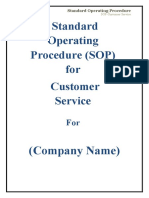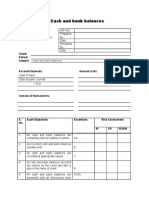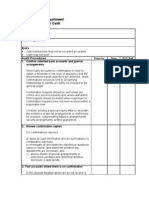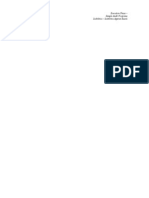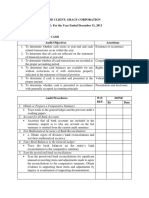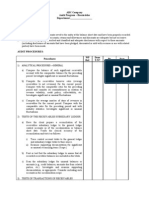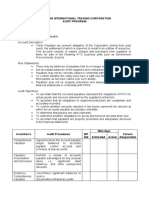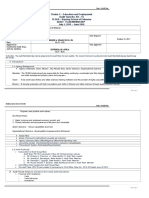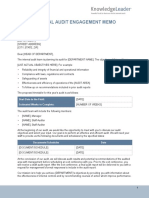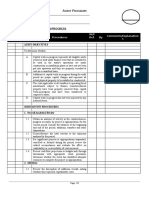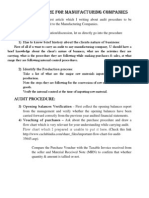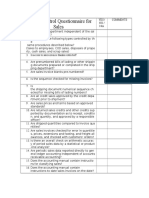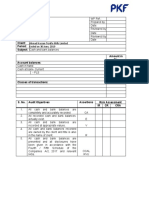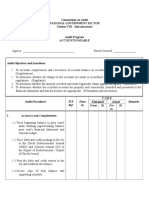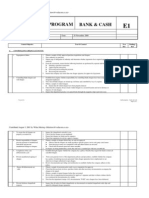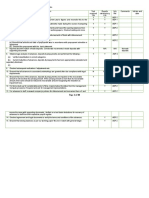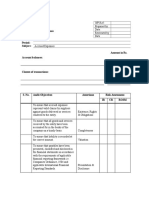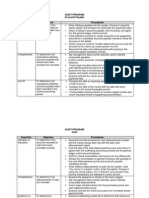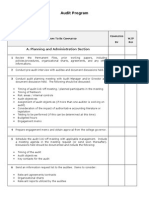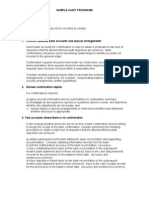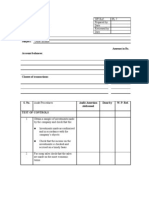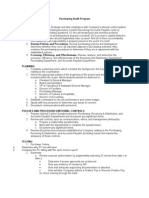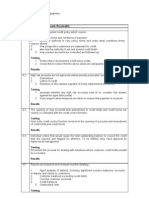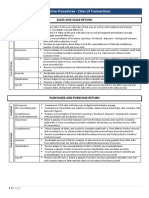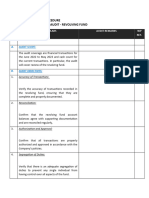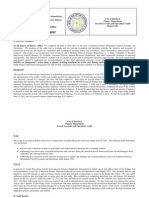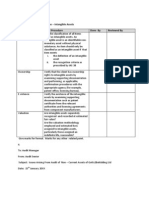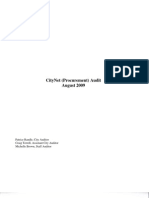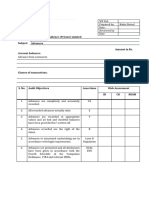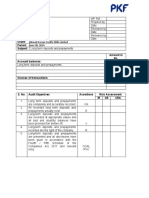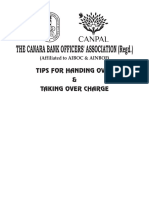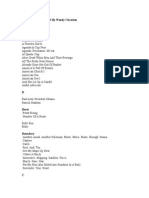100%(1)100% found this document useful (1 vote)
240 viewsAudit Program Cash and Bank Balances
Audit Program Cash and Bank Balances
Uploaded by
Grace UnayThis document provides an audit program for cash and bank balances. It outlines 10 audit objectives and the related audit procedures and assertions. The objectives are to ensure cash and bank balances are completely recorded, exist, recorded at the proper value, owned by the client, and properly presented and disclosed in the financial statements. Audit procedures include testing controls, analytical procedures, and tests of details such as attending the year-end cash count, examining bank reconciliations, and ensuring disclosures meet regulatory requirements.
Copyright:
© All Rights Reserved
Available Formats
Download as PDF, TXT or read online from Scribd
Audit Program Cash and Bank Balances
Audit Program Cash and Bank Balances
Uploaded by
Grace Unay100%(1)100% found this document useful (1 vote)
240 views4 pagesThis document provides an audit program for cash and bank balances. It outlines 10 audit objectives and the related audit procedures and assertions. The objectives are to ensure cash and bank balances are completely recorded, exist, recorded at the proper value, owned by the client, and properly presented and disclosed in the financial statements. Audit procedures include testing controls, analytical procedures, and tests of details such as attending the year-end cash count, examining bank reconciliations, and ensuring disclosures meet regulatory requirements.
Original Description:
PROGRAM GUIDE AND QUESTIONNAIRE
Original Title
CASH AUDIT
Copyright
© © All Rights Reserved
Available Formats
PDF, TXT or read online from Scribd
Share this document
Did you find this document useful?
Is this content inappropriate?
This document provides an audit program for cash and bank balances. It outlines 10 audit objectives and the related audit procedures and assertions. The objectives are to ensure cash and bank balances are completely recorded, exist, recorded at the proper value, owned by the client, and properly presented and disclosed in the financial statements. Audit procedures include testing controls, analytical procedures, and tests of details such as attending the year-end cash count, examining bank reconciliations, and ensuring disclosures meet regulatory requirements.
Copyright:
© All Rights Reserved
Available Formats
Download as PDF, TXT or read online from Scribd
Download as pdf or txt
100%(1)100% found this document useful (1 vote)
240 views4 pagesAudit Program Cash and Bank Balances
Audit Program Cash and Bank Balances
Uploaded by
Grace UnayThis document provides an audit program for cash and bank balances. It outlines 10 audit objectives and the related audit procedures and assertions. The objectives are to ensure cash and bank balances are completely recorded, exist, recorded at the proper value, owned by the client, and properly presented and disclosed in the financial statements. Audit procedures include testing controls, analytical procedures, and tests of details such as attending the year-end cash count, examining bank reconciliations, and ensuring disclosures meet regulatory requirements.
Copyright:
© All Rights Reserved
Available Formats
Download as PDF, TXT or read online from Scribd
Download as pdf or txt
You are on page 1of 4
Audit Program Cash and bank balances
Audit Program WP Ref.:
Prepared
(i) Cash and bank balances by:
Date:
Reviewed
by
Date
Client:
Period:
Subject: Cash and bank balances
Account balances: Amount in Rs.
Cash in hand
Cash at bank- Current
- PLS
Classes of transactions:
S. Audit Objectives Assertions Risk Assessment
No.
IR CR ROSM
1. All cash and bank balances are
completely and accurately recorded CA
2. All recorded cash and bank balances
actually exist. E
3. All cash and bank balances are
recorded at appropriate values. V
4. All cash and bank balances recorded
are owned by the client and title is
also in the name of client. R
5. All cash and bank balances are OCAL
presented and all disclosures have
been given in accordance with the
Fourth Schedule of the Companies
Ordinance, 1984 and relevant IASs. RVU
S. Audit Procedures Objective Done by W. P. Ref.
No.
Test of Controls
1. Assess the reasonableness of design of ALL
system of internal control by enquiring
relevant client personnel and documenting
the same (if not a documented system
manual has been developed by the client).
A walk through test would be necessary to
confirm the understanding as documented.
Identify the preventive (exercised before
incurrence of transactions and event) and
detective (exercised after incurrence of
transactions and event) controls
established by management to support its
assertions.
2. Check on sample of selected transactions ALL
covering the whole period that all
preventive controls are exercised on all
transactions.
3. Check on a sample of transactions that ALL
detective controls are appropriately been
exercised and in case of any detection of
error/ fraud, proper steps have been taken
to avoid recurrence of the same.
4. Check that proper bank reconciliations are ALL
prepared, checked and approved. Long
outstanding items are followed up and
proper disposition of such items is made.
5. Proper segregation of duties between CE
custodian and accounting and approving
personnel exist.
6. Payments vouchers are appropriately ECA
prepared and properly approved by
designated authority.
S. Audit Procedures Objective Done by W. P. Ref.
No.
7. Ensure that management does not override
the designed controls by
Enquiring from the designated staff
person
Remain skeptical during performing
test of design and test of effective operation
8. Document the conclusion after performing N/A
test of controls and required level of
assurance from substantive procedures.
Analytical Procedures
1. Document logical commercial reasons for AU
new bank accounts opened and closed
during the year.
2. Compare current year balances with last CEA
year balances and ensure that any
significant variation should be properly
and logically reasoned.
Test of Details
1. Attend year-end cash count and deposit E
verification.
2. Circularize direct confirmations to all ER
banks.
3. Trace opening balance in general ledger CE
from last year working papers.
4. Obtain and examine bank reconciliations CEA
ensure the following: -
No long outstanding item should
remain unfollowed,
No revenue nature item should be
appearing
All deposit made should be
S. Audit Procedures Objective Done by W. P. Ref.
No.
cleared within two days
No long outstanding cheques of
significant amount are unpresented; if so
then check their payment voucher and
ensure that no discrepancy is involved.
5. Ensure that all balances etc. reported by CA
bank in replies to bank confirmation
request are included in records of the
client.
6. Ensure that no balances are subject any U
encumbrance, if so then disclosure is
made.
7. Convert FCY accounts into PKR at year- V
end rate.
8. Ensure that all bank accounts are in R
company's name.
9. Ensure that closing balances as per our N/A
working paper file are in match with
general ledger.
10. Determine that disclosures have been OCAL
made in accordance with the RVU
requirements of Fourth Schedule to the
Companies Ordinance, 1984 and the
applicable IASs.
You might also like
- 15000+ ChatGPT Prompts, (Crafti - Pro) - TareasDocument367 pages15000+ ChatGPT Prompts, (Crafti - Pro) - TareasMudassir Masood90% (10)
- Standard Operating Procedure For Customer ServiceDocument8 pagesStandard Operating Procedure For Customer ServiceEntoori Deepak Chand100% (4)
- The First Easter MonologueDocument4 pagesThe First Easter MonologuePastor JeanneNo ratings yet
- Audit Program Cash and Bank BalancesDocument4 pagesAudit Program Cash and Bank Balances구니타100% (1)
- Internal Audit Department Audit Program For Cash: Audit Scope: Audit ObjectivesDocument3 pagesInternal Audit Department Audit Program For Cash: Audit Scope: Audit ObjectivesRijo Jacob75% (4)
- Audit Program-Long Term DebtDocument11 pagesAudit Program-Long Term DebtRoemi Rivera Robedizo100% (3)
- JVS, SAS Proven Message SwipesDocument21 pagesJVS, SAS Proven Message SwipesSidharth Sunil100% (1)
- Audit ProgramDocument16 pagesAudit Programanon_806011137100% (5)
- Audit ProgramsDocument492 pagesAudit ProgramsNa-na Bucu100% (7)
- ABC Company Audit Program - Receivables Department:: 1) Analytical Procedures-GeneralDocument7 pagesABC Company Audit Program - Receivables Department:: 1) Analytical Procedures-Generalvarghese200779% (14)
- Philippine International Trading Corporation Audit ProgramDocument2 pagesPhilippine International Trading Corporation Audit ProgramNephtali Gonzaga100% (2)
- Audit Plan TESDA-DSF LongDocument10 pagesAudit Plan TESDA-DSF LongRussel SarachoNo ratings yet
- Accruals Audit ProgramDocument4 pagesAccruals Audit Programvivek1119No ratings yet
- Internal Audit Engagement MemoDocument2 pagesInternal Audit Engagement MemoJane Pham67% (3)
- K AP 3 Capital Work in ProgressDocument5 pagesK AP 3 Capital Work in Progresssibuna151100% (1)
- 13 Audit Procedure For Manufacturing CompaniesDocument3 pages13 Audit Procedure For Manufacturing CompaniesManish Kumar Sukhija67% (3)
- Internal Control Questionnaire For SalesDocument1 pageInternal Control Questionnaire For SalesJustine Ann VillegasNo ratings yet
- 09 - Cash and Bank BalancesDocument4 pages09 - Cash and Bank BalancesAqib SheikhNo ratings yet
- 05 ALCAR ApproachDocument25 pages05 ALCAR ApproachVaidyanathan Ravichandran100% (2)
- CASE ANALYSIS: Microsoft Office: Gaining Insight Into The Life of A College Student (A)Document4 pagesCASE ANALYSIS: Microsoft Office: Gaining Insight Into The Life of A College Student (A)Ayesha Lashari0% (1)
- W.P BSAccount RecDocument2 pagesW.P BSAccount RecnaimaNo ratings yet
- Cash Audit ProgramDocument7 pagesCash Audit ProgramEirene Joy VillanuevaNo ratings yet
- Audit ProgrammesDocument63 pagesAudit ProgrammesSarah Hashem100% (1)
- Aud. Program - Accounts PayableDocument6 pagesAud. Program - Accounts PayableRalph Christer MaderazoNo ratings yet
- AP 15 Accounts Receivable and Sales PDFDocument8 pagesAP 15 Accounts Receivable and Sales PDFDicky Affri SandyNo ratings yet
- Audit Program: Property Plant and EquipmentDocument8 pagesAudit Program: Property Plant and EquipmentAqib Sheikh100% (3)
- Long Term Debt ProgramDocument10 pagesLong Term Debt ProgramSyarif Muhammad Hikmatyar100% (1)
- Audit Program For Fixed Assets: Form AP 35Document9 pagesAudit Program For Fixed Assets: Form AP 35Adrianna LenaNo ratings yet
- Audit Program Bank and CashDocument4 pagesAudit Program Bank and CashFakhruddin Young Executives75% (4)
- Advances - Deposits - and - Prepayments - Audit - Program - TODDocument20 pagesAdvances - Deposits - and - Prepayments - Audit - Program - TODShohag RaihanNo ratings yet
- Audit of Cash On Hand and in BankDocument2 pagesAudit of Cash On Hand and in Bankdidiaen100% (1)
- Sample Audit ProceduresDocument44 pagesSample Audit ProceduresNetra Sharma100% (1)
- Accounts Receivable Audit ProgramDocument3 pagesAccounts Receivable Audit Programaliraz101100% (2)
- Audit Program-Accrued ExpensesDocument10 pagesAudit Program-Accrued ExpensesPutu Adi NugrahaNo ratings yet
- AUDIT PROGRAM For Cash Disbursements 2Document5 pagesAUDIT PROGRAM For Cash Disbursements 2Yvonne Granada50% (2)
- Audit Program For Inventory Legal Company Name Client: Balance Sheet DateDocument3 pagesAudit Program For Inventory Legal Company Name Client: Balance Sheet DateHannah TudioNo ratings yet
- Audit Program: A. Planning and Administration SectionDocument3 pagesAudit Program: A. Planning and Administration SectionIzZa Rivera0% (1)
- Sample Audit ProgramDocument9 pagesSample Audit Programjanyanjanyan67% (3)
- Audit Program For Other IncomeDocument3 pagesAudit Program For Other IncomeCollins O.71% (7)
- Purchasing Audit ProgramDocument3 pagesPurchasing Audit ProgramBernie LeBlanc100% (1)
- Substantive Audit Program ARDocument3 pagesSubstantive Audit Program ARderfred00No ratings yet
- AssertionsDocument2 pagesAssertionsHaseeb KhanNo ratings yet
- AP 55 Accrued LiabilitiesDocument5 pagesAP 55 Accrued LiabilitiesMichelle SumayopNo ratings yet
- Statement of Financial Position (Balance Sheet) Assertions: Government Accounting & AuditingDocument3 pagesStatement of Financial Position (Balance Sheet) Assertions: Government Accounting & AuditingCarmelo CuyosNo ratings yet
- Internal Audit ProgramDocument3 pagesInternal Audit ProgramTakogee100% (1)
- Audit Program Fixed AssetsDocument6 pagesAudit Program Fixed Assetsnico_pia454No ratings yet
- Audit Program On Inter-Agency ReceivablesDocument2 pagesAudit Program On Inter-Agency ReceivablesHoven Macasinag100% (1)
- Ap Audit DocumentDocument7 pagesAp Audit DocumentAnna Tran100% (1)
- Inventory Audit Work ProgramDocument19 pagesInventory Audit Work ProgramAdnan MohammedNo ratings yet
- Test of Controls and Substantive ProceduresDocument16 pagesTest of Controls and Substantive ProceduresAdeel Sajjad100% (5)
- Chapter 4: Engagement Process and PlanningDocument20 pagesChapter 4: Engagement Process and Planningdaniel100% (2)
- Preparation Audit ProgramDocument8 pagesPreparation Audit ProgramJem Vadil100% (1)
- Audit Accounts PayableDocument7 pagesAudit Accounts PayableMacmilan Trevor Jamu0% (1)
- Audit Programme 1Document20 pagesAudit Programme 1Neelam Goel50% (2)
- 10chap Audit Working Papers PDFDocument10 pages10chap Audit Working Papers PDFjezNo ratings yet
- Audit Program - Revolving FundDocument11 pagesAudit Program - Revolving FundAlvin Lozares Casaje100% (1)
- Hartford Payroll Audit ReportDocument10 pagesHartford Payroll Audit ReportkevinhfdNo ratings yet
- Gotts2BeKidding LTD SolutionsDocument3 pagesGotts2BeKidding LTD SolutionsPikinisoNo ratings yet
- Investment - Audit Program - HandoutsDocument2 pagesInvestment - Audit Program - HandoutsRoquessa Michel R. IgnaligNo ratings yet
- Procurement Audit SampleDocument13 pagesProcurement Audit SampleCyrile Dianne Therese Ablir-BaliolaNo ratings yet
- Audit Plan For CashDocument5 pagesAudit Plan For CashDiana PrinceNo ratings yet
- 1a. AdvancesDocument4 pages1a. Advancesrizwan.rasgNo ratings yet
- Audit Program: Provision Against Long Term Deposits Against UtilitiesDocument4 pagesAudit Program: Provision Against Long Term Deposits Against UtilitiesAqib SheikhNo ratings yet
- 05 - Long Term Loans and AdvancesDocument5 pages05 - Long Term Loans and AdvancesAqib SheikhNo ratings yet
- 08 - Advances, Deposits, Prepayments and Other ReceivablesDocument4 pages08 - Advances, Deposits, Prepayments and Other ReceivablesAqib SheikhNo ratings yet
- TIPS FOR HANDING OVER & TAKING OVER Booklet 03-06-17Document32 pagesTIPS FOR HANDING OVER & TAKING OVER Booklet 03-06-17sahilNo ratings yet
- STA Request (11) High Performance StarlinkDocument1 pageSTA Request (11) High Performance Starlinkmichaelkan1No ratings yet
- End of Chapter Exercises - AnswersDocument4 pagesEnd of Chapter Exercises - AnswersYvonneNo ratings yet
- Case Study (The Flaundering Expatriate)Document9 pagesCase Study (The Flaundering Expatriate)Pratima SrivastavaNo ratings yet
- The Situationists in The USADocument9 pagesThe Situationists in The USAcaptainfreakoutNo ratings yet
- Black in The Baroque RACISM IDocument16 pagesBlack in The Baroque RACISM IMikhail BakuninNo ratings yet
- Chapter Two Nature and Kinds of ContractsDocument8 pagesChapter Two Nature and Kinds of ContractsHarshad SavantNo ratings yet
- LEDC Volcano Case StudyDocument14 pagesLEDC Volcano Case StudyleobutterflyNo ratings yet
- The First PersonDocument2 pagesThe First Personcarmenta777No ratings yet
- Penology and VictimologyDocument13 pagesPenology and VictimologyAditi ParmarNo ratings yet
- United States v. Bernard Douglas Holland, A/K/A "Bernie", 866 F.2d 1416, 4th Cir. (1989)Document2 pagesUnited States v. Bernard Douglas Holland, A/K/A "Bernie", 866 F.2d 1416, 4th Cir. (1989)Scribd Government DocsNo ratings yet
- CUP OF JERUSALEM by Wendy Chasteen Index ADocument7 pagesCUP OF JERUSALEM by Wendy Chasteen Index Aapi-182886101No ratings yet
- BCG Potential Test MCP PDFDocument23 pagesBCG Potential Test MCP PDFKiiaf100% (1)
- Human Resources Planning at Vaibhav IncDocument2 pagesHuman Resources Planning at Vaibhav IncSree BalajiNo ratings yet
- Samil 5-21-2024 2-40-02 AM Inventory ListDocument30 pagesSamil 5-21-2024 2-40-02 AM Inventory ListKunal ShawNo ratings yet
- Corrective Action Request: Company: Agrasen Engineering Industries LTDDocument3 pagesCorrective Action Request: Company: Agrasen Engineering Industries LTDJamil VoraNo ratings yet
- DBM CSC FormDocument4 pagesDBM CSC FormJing Goal Merit0% (1)
- Test Paper: Stage - Ii: Class: ViiiDocument20 pagesTest Paper: Stage - Ii: Class: ViiiShorya KumarNo ratings yet
- Leadership Mastery Guide - Part 1Document10 pagesLeadership Mastery Guide - Part 1VivianneNo ratings yet
- Financial Well-Being of Auto Drivers in BangaloreDocument6 pagesFinancial Well-Being of Auto Drivers in Bangaloref6ny65qwkvNo ratings yet
- Accounting Assignment & CATDocument14 pagesAccounting Assignment & CATMargaret IrunguNo ratings yet
- Erich Fromm and The Ontology of Social Relations: November 2018Document31 pagesErich Fromm and The Ontology of Social Relations: November 2018Brian CaterinoNo ratings yet
- MemeCoin TerminologyDocument4 pagesMemeCoin TerminologyAle XyyNo ratings yet
- Earth at GlanceDocument2 pagesEarth at GlanceJavaid Ali ShahNo ratings yet
- Rehab CentresDocument78 pagesRehab CentresSashank BogatiNo ratings yet

